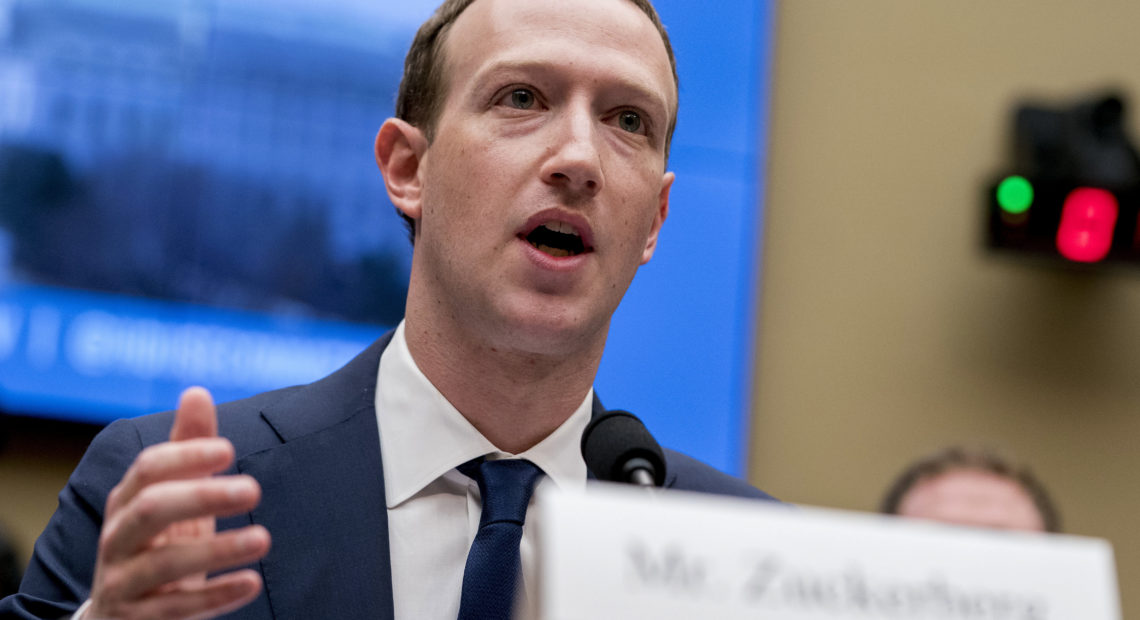
Did Facebook CEO Mark Zuckerberg Intend To Deceive In Sharing User Data?
Facebook CEO Mark Zuckerberg testifies before the House Energy and Commerce Committee on April 11, 2018. CREDIT: Andrew Harnik/AP
LISTEN
BY AARTI SHAHANI
Facebook has a long track record in deception: telling people one thing, while doing another. That’s according to federal regulators, at least one of whom says the government missed its chance to find out why the company has repeatedly misled its users.
This past week, the Federal Trade Commission decided to enter into a settlement with Mark Zuckerberg without interviewing him first. The FTC secured a $5 billion penalty from Facebook but, FTC Commissioner Rohit Chopra says, the agency sacrificed discovering the truth about the CEO in the process.
“It’s still really a mystery to me as to what role [Zuckerberg] played,” says Chopra, who opposed the settlement.
The FTC complaint against Facebook highlights a prominent moment when Zuckerberg said one thing while his company did another.
“The thing is, we don’t ever want anyone to be surprised about how they’re sharing on Facebook. I mean that’s not good for anyone,” Zuckerberg told the audience of Facebook’s annual F8 conference in 2014.
Regulators at the FTC had investigated Facebook for taking the personal data of users and, without consent, handing it off to outsiders — third-party app developers. Following that and other embarrassing revelations, Zuckerberg made a promise.
“Now, everyone has to choose to share their own data with an app themselves,” he said. “We think that this is a really important step for giving people power and control.”
Sounds great. Only, it wasn’t true. According to the FTC, Facebook kept handing over user data secretly — without consent — to dozens of outside developers (like Cambridge Analytica, the political research firm that worked on President Trump’s campaign).
It wasn’t the only time Zuckerberg misrepresented the truth. In 2018, he did it again — this time not on his own stage, but in front of the entire country.
Zuckerberg — summoned to the U.S. Congress — apologized for enabling Russian interference in the American elections, for helping to spread fake news and hate speech, and for violating the privacy of users.
“It’s clear now that we didn’t do enough to prevent these tools from being used for harm as well,” he testified. “And that was a big mistake, and it was my mistake, and I’m sorry. I started Facebook. I run it, and I’m responsible for what happens here.”
Sounds great. Only, in the same month Zuckerberg gave that testimony (it was in April 2018), regulators say, the company began to use facial-recognition tracking on some 60 million users — again, without consent.
The FTC’s Chopra voted against entering the settlement with Facebook.
“We cut off this investigation too early, [and] Facebook was willing to pay more money in order to hide Mark Zuckerberg’s testimony from this investigation,” he says.
Three Republican FTC members voted in favor of settling. The FTC extracted a $5 billion penalty from Facebook. Agency officials say that’s more than the government would have gotten in court, if they’d litigated.
Chopra, a Democrat, says his agency underplayed its hand, and missed the opportunity to uncover if Zuckerberg’s misrepresentations were intentional. The FTC spoke to Zuckerberg’s lawyers, but not to him. He was not required to answer questions or turn over his emails; and the settlement lets the CEO off the hook for the many privacy mishaps the FTC scrutinized. Zuckerberg did not personally face charges for violating an earlier settlement his company had reached with the FTC in 2011, though he could have been.
“Facebook fully cooperated with the FTC’s investigation and provided tens of thousands of documents, files and emails—including from Mark Zuckerberg,” Colin Stretch, Facebook’s general counsel, said in a statement Sunday after this story aired.
The new FTC settlement includes provisions that could hold Zuckerberg liable, through civil and criminal penalties, for any future violations of the agreement with the commission.
Zuckerberg’s actions may stand at odds with the philanthropic, altruistic image he’s worked hard to cultivate. CEOs break rules all the time. The ousted chief of Uber appeared to take pride in bulldozing his way into cities, assuming the laws that apply to cabs didn’t apply to his operation. But Zuckerberg has worked very hard to project the image of model super citizen: Harvard dropout committed to connecting the world with an American brand that’s more omnipresent that Coca-Cola; funding woefully neglected school systems; and conducting a listening tour to hear real people.
(Facebook is one of NPR’s financial sponsors.)
It bothers Chopra that his agency didn’t pursue the truth because Zuckerberg isn’t just a CEO. He has structured the stock so that he controls the majority of votes in Facebook. Chopra explained in his written dissent that in other cases, when a chief calls the shots in a company, the FTC takes a hard look at them.
“We didn’t even want to look at something that seemed fundamentally important, and instead traded it away for a higher fine, and none of that money will actually go to Facebook’s users,” Chopra says. The $5 billion goes to the U.S. Treasury, as mandated by law.
Zuckerberg lauded the settlement, saying in a post that his company has a “privacy-focused vision” and that, while Facebook already works hard to protect people’s privacy, “now we’re going to set a completely new standard for our industry.” He did not mention that his company fought tooth and nail, according to regulators, against the fine and new external oversight the deal imposed on Facebook.
Meanwhile, Zuckerberg’s team is on Capitol Hill, trying to get permission to mint money — a new digital currency. This cannot succeed without the public trust. Facebook is making the case that lawmakers and regulators should trust it. But Chopra says he doesn’t trust Zuckerberg or his company.
NPR business desk intern Amy Scott contributed to this report.















